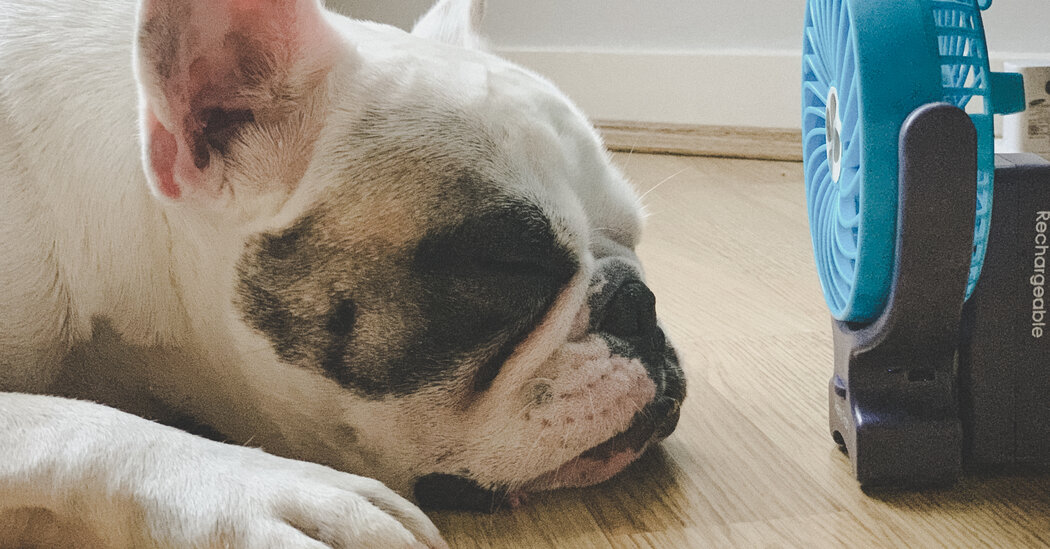- August 3, 2022
- No Comment
- 6 minutes read
How to Keep Your Pets Cool During a Heat Wave – The New York Times

Advertisement
As extreme heat blankets large swaths of the globe, pet owners have particular cause for concern.
“If it feels too hot to you, it’s even worse for your pet,” said Dr. Sarah Hoggan, medical director for VCA California Veterinary Specialists —Murrieta.
Heat stroke can be fatal for dogs, cats and other animals — but simple precautions can help them get through a heat wave. Here’s what you need to know to keep your pets safe.
Keep pets inside as much as possible.
Ideally, keep your pet in air-conditioned spaces for as much of the day as you can. If you don’t have air-conditioning, plop your pet near a fan. In general, you want to keep pets in an area that is not hotter than 80 degrees, Dr. Hoggan said.
If you need to leave your pets outside, make sure they have enough shade and fresh water. Do not leave them unsupervised for more than a few minutes, and make sure the animals are not left directly in the sun, said Dr. Jerry Klein, a chief veterinary officer at the American Kennel Club.
For animals that are normally kept in cages, like rabbits, positioning a small fan nearby or placing a frozen water bottle in the cage can help them cool themselves, said Dr. Hoggan.
Time your walks.
Especially in cities, where hot sidewalks and pavement can burn and blister paws, try to avoid the peak heat in the middle of the day. Set an alarm and walk your dog early in the morning, taking the shadiest route possible. Or save the stroll for after the sun goes down. You can also consider buying dog boots to protect your pets’ paws, said Dr. Lori Teller, incoming president of the American Veterinary Medical Association.
Be sure to not overexercise your dog, either. Take frequent breaks, and make sure to carry water with you.
Don’t leave your pet alone in the car, even for a few minutes.
Hundreds of pets die from heat exhaustion each year after they are left in parked vehicles. It doesn’t matter if you crack the windows or park the car in the shade, the interior of a car can still reach 120 degrees Farenheit (or 49 degrees Celsius) in a matter of minutes, said Katie Wilkes, a spokesperson at the American Red Cross.
“Every year, we say it, and every year people forget,” Dr. Klein said.
Know which pets are at highest risk.
An animal that is very old, very young or has underlying health issues is at higher risk for heat stroke and exhaustion when the temperatures climb, Dr. Hoggan said. Dog and cat breeds with thicker coats, like huskies, golden retrievers and Siberian cats, are also at risk.
Animals with shorter snouts and “smushed” or squished faces — like pugs, English and French bulldogs, Boston terriers and Persian and Himalayan cats — are extremely susceptible to heat, Dr. Teller said. These pets are not able to pant as effectively, and so they can struggle to regulate their temperatures. Make sure they spend as little time outside as possible, she advised.
Know the signs of overheating, and act quickly.
If your pet is panting excessively, with thick, ropy saliva, acting unusually lethargic, vomiting or experiencing diarrhea, get care immediately. In dogs, signs of heat stroke also include a deep red tongue and brick red gums. For cats, open-mouth breathing can indicate that they are too hot.
Animals with heat exhaustion or heat stroke may also act confused, Dr. Teller said. Cats and dogs might not respond to their names or simple commands, and some may stagger. “They may seem to not fully be with it,” she said.
Don’t delay care if your pet shows these signs. Moisten towels with cool water — not ice water, which can cause blood vessels to constrict — and wrap them around your pet. You can also buy cooling vests in pet stores, Dr. Teller said. Take your pet to a vet or animal hospital as soon as you can. The Red Cross has a pet safety app with instructions for animal first aid, as well as a directory of local animal emergency resources.
“You don’t want to make a mistake that could potentially cost you your pet’s life,” said Ms. Wilkes.
Advertisement

